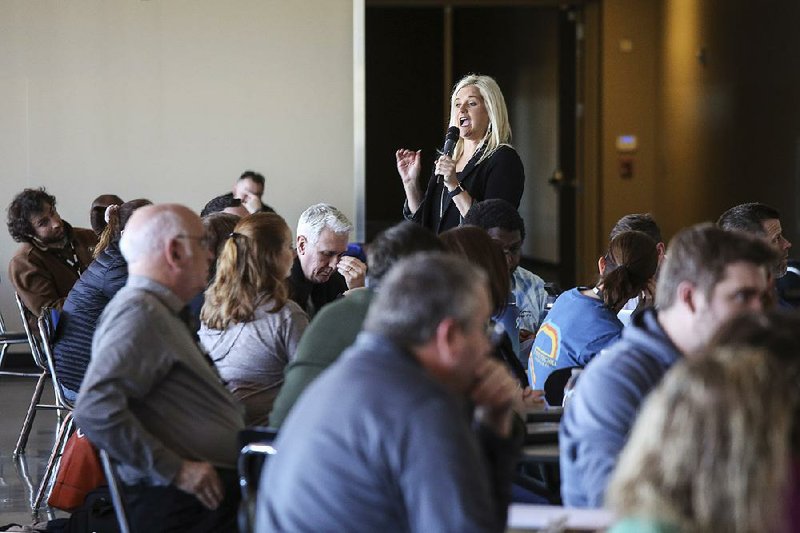Forward Arkansas, an organization established by two of the state's prominent philanthropic foundations, is turning its attention to increasing the pool of qualified, diverse classroom teachers.
In the next few weeks, the nonprofit organization will award grants of $100,000 to the colleges, schools and departments of education at six higher-education institutions to support yearlong planning of strategies to more effectively recruit, train and retain classroom teachers.
From among the six universities that receive the competitive planning grants, a subset of the educator-preparation programs will be selected for additional funding and resources necessary to carry out their plans in the following three years.
"Arkansas schools already face a significant shortage of teachers, and covid-19 has made it worse," said Ben Kutylo, executive director of Forward Arkansas. "Addressing this challenge is foundational to improving education in Arkansas. We need to act quickly and effectively or we will see lasting negative impacts across all districts, particularly in Arkansas' most marginalized schools."
Ivy Pfeffer, deputy commissioner for the Arkansas Division of Elementary and Secondary Education, welcomed the Forward Arkansas initiative that is being financed by the Winthrop Rockefeller and Walton Family foundations.
"Now, more than ever, Arkansas schools need qualified candidates to fill teaching positions," Pfeffer said in an email. "The decrease in enrollment in educator preparation programs over the last few years has resulted in fewer fully-certified candidates who are available for employment. Multiple efforts are needed, but the efforts need to be aligned and coordinated."
The initiative is a way to improve the quality of education for the kindergarten-through-12th graders wherever they live in the state, she said.
"These grants can provide an opportunity for Arkansas educator preparation programs to partner with local school districts and invest in regional and local efforts to recruit and retain future educators and provide an excellent education to all students," she said.
The Forward Arkansas grant program arrives in the aftermath of a March study that concluded that the shortage of licensed teachers is a contributor to below-national-average achievement by Arkansas students on the most recent 2019 National Assessment of Education Progress test. The test is given every two years to a representative sample of students nationwide.
The study -- "Missing Out: Arkansas' Teacher Shortage and How to Fix It" -- reported that as many as 1,360, or about 4% of Arkansas' 34,000 practicing teachers, do not hold state licenses to teach -- compared with 1.7% nationally -- and that another 3% are licensed but are teaching a subject other than what they are licensed to teach.
A state license signifies that a teacher has at least a bachelor's degree and a set level of mastery of the subject in which the person is certified. The Missing Out study noted that a state license by itself does not guarantee an effective teacher, but the fact that not all classroom leaders meet that bar is a problem.
The March study -- done by the TNTP that was previously known as The New Teacher Project -- found that the state shortage of licensed teachers is more pronounced in east and south Arkansas, and Black students are "five times more likely to attend school in a high-shortage district than white students," according to data in the report.
Thirty of the state's 238 traditional school districts -- a number that excludes charter school systems -- have 10% or more of their teaching staffs working without standard teacher licenses, the study found. In seven of those districts, the percentage is 30% or more. And in the Helena-West Helena and Forrest City school districts, the percentages of nonlicensed teachers exceed the percentages with licenses.
Kutylo of Forward Arkansas said the number and amounts of the implementation grants, which will follow the planning grants, are yet to be decided.
"It will be based on the proposals that are developed through this planning phase, he said. "Our hope is to get as many compelling proposals as possible."
The proposals will be evaluated in part by their incorporation of emerging strategies, Kutylo said.
"Another priority is making the experience for teacher candidates much more practice based," he said, "so that means more time in schools and more time with mentor teachers to be more prepared for that role when they step into it."
Additionally, the college and university proposals will be reviewed for their efforts to form closer relationships with school districts so as to better understand and meet the needs of the schools and districts, he said.
"Our teachers need to be prepared and supported to address the changing realities in schools and the needs of today's students," Kutylo continued. "We believe this program will support university-based educator preparation programs in providing a rigorous, modern and job-based experience. [The result will be] more high-quality and diverse educators across the state."
Once the six teacher-education programs are selected, Forward Arkansas will work with national partners US PREP, TPI-US and 2Revolutions to help the grant-receiving programs design and plan for the growth and improvement of their programs.
Throughout the process, Forward Arkansas will collaborate closely with the Arkansas Department of Education to ensure the new initiatives are aligned with state education priorities.
"Clearly, a good teacher can make a tremendous difference," Kutylo said. "Our goals are that within five years, Arkansas will be producing more high-quality and diverse teachers, especially in high-need areas of the state, and that performance levels and retention rates will have increased. That will have a positive impact on kindergarten-12th grade student outcomes, as students graduate and move on to college or careers."
More information about Forward Arkansas is available on the organization's website: forwardarkansas.org.
